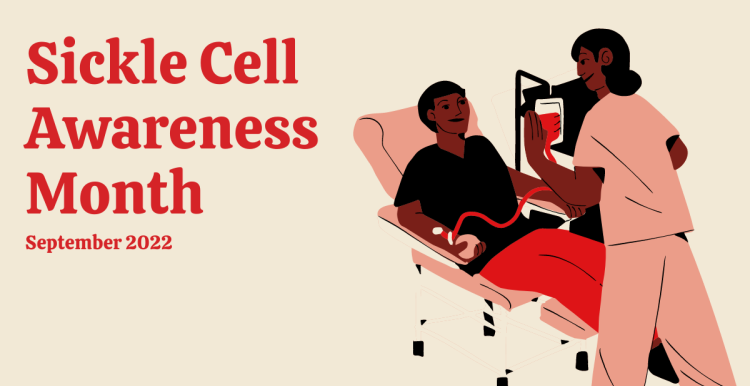Sickle Cell Awareness Month

What is Sickle Cell Disorder?
Sickle cell disorder is a long-term inherited disease that causes abnormally shaped haemoglobin to stick together and cause blockages inside the bloodstream. It is the fastest-growing genetic disorder in the UK and mainly affects people of Black heritage and Caribbean descent. The disease can affect people's lives, with symptoms varying from jaundice to chronic fatigue. In severe cases, people with this disease could have long-term health complications such as organ damage and stroke. Approximately, there are 15.000 people with Sickle Cell disease in the UK, and around 270 babies with this disease are born yearly.
Regular blood transfusions are required to treat these conditions, and the treatment is more likely to be successful if the blood closely matches the patient's blood type. Thus, the need for more Black blood donors to come forward is urgent as they are more likely to have Ro blood type, which is vital to treat sickle cell disease. However, the NHS is running critically low on blood donations, with data showing that only 1% of the Black population in the UK are blood donors. Black donors are hesitant to donate blood due to various reasons, including lack of knowledge, feelings of fear, and mistrust. It is important for the Black community to come forward to donate their blood to fulfill the demand.
Why should you be a blood donor?
We are all given the ability to save someone's life with the blood in our bodies that we take for granted. Your blood not only helps those suffering from chronic conditions such as Sickle Cell disease but also women with pregnancy complications, people with severe trauma due to accidents, people with complex medical procedures, and cancer patients. You can help up to 3 people every time you donate your blood.
What to expect at your blood donation appointment?
Giving blood is a safe and straightforward process. You only need to visit this website or download NHS Give Blood mobile apps to register and make an appointment, or visit a drop-in session. At the donor site, the donor staff will give you a bottle of water and a leaflet giving you all the details about giving blood. Next, they will do a health screening on you to go over eligibility requirements, ensure your blood is safe for the patient to receive. You will then proceed to give blood which takes no more than 10 minutes. Once you have done, you will be directed to the rest area where you get a small snack and drink. The whole process only lasted 15 minutes.
You don't have to prepare or bring anything to your blood donation session. However, make sure you have a good sleep (7-8 hours) the night before, eat regularly, drink enough water, and avoid doing any heavy exercise on the day of the donor.
Did you know that donating blood also benefits your health?
Surprisingly, donating blood gives benefits to both the recipient and the donors such as:
- Maintains your hearth health
- Lower the risk of cancer
- Stimulates new blood cell production to reduce harmful iron stores
- Reduces cardiovascular risk
We call it a win-win solution! Let's ask ourselves today: when was the last time we donated blood? Are we donating today? Remember that the happiest people are not those getting more but those giving more.
Visit https://www.blood.co.uk/ for further information about giving blood and follow @GiveBloodNHS on twitter.
Find out more
To register for a blood donation in Newham or find out more information, contact details are listed below:
0300 123 23 23
NHS Blood Donation Centre, Ground Floor, Westfield Shopping Centre, Stratford City, London, E20 1EJ
Supported by Community Barnet Blood Donorship Campaign.
